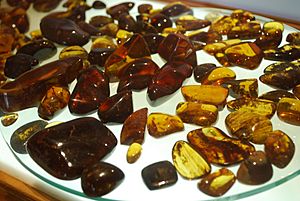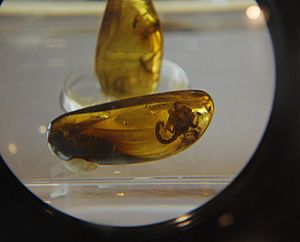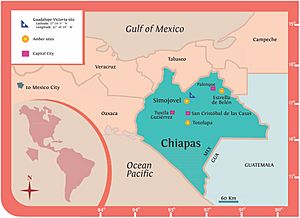Mexican amber facts for kids

Mexican amber, also called Chiapas Amber, is a type of amber found in Mexico. It formed a very long time ago, about 25 million years ago. This was during the late Oligocene and early Miocene periods. Like other ambers, Mexican amber often has tiny creatures and plants trapped inside. These can be insects, spiders, or even pieces of leaves and fungi.
Contents
Where Mexican Amber is Found
Most Mexican amber comes from rocks in the Simojovel area of Chiapas, Mexico. It is one of the most important minerals found in Chiapas. Much of this amber is about 25 million years old. Its quality is similar to the famous Dominican amber.
Chiapan amber has special features. Many pieces are very clear. Some even have fossilized insects and plants inside. Most Chiapan amber is used to make beautiful jewelry. This includes pendants, rings, and necklaces. The colors of the amber can be white, yellow, orange, or deep red. You can also find green and pink pieces.
Since ancient times, local people have believed amber has special powers. They thought it could heal and protect them.
The biggest amber mine is in Simojovel. This is a small village about 130 kilometers from Tuxtla Gutiérrez. Simojovel produces 95% of all amber from Chiapas. Other mines are in places like Huitiupán and Totolapa. The Museum of Amber in San Cristóbal says that almost 300 kilograms of amber are dug up each month. The price of amber changes based on its quality and color.
This amber is very old. The youngest pieces are about 22.5 million years old. The oldest pieces can be up to 26 million years old.
How Mexican Amber Was Made
Mexican amber was made from the sap of two types of ancient trees. These trees are now extinct. Their names are Hymenaea mexicana and Hymenaea allendis. Scientists first learned about these trees from fossilized flowers found inside Mexican amber.
Animals and Plants Trapped in Amber

Many amazing fossils have been found trapped in Mexican amber. These are called fossil inclusions. They include insects, spiders, and even small pieces of plants.
For example, a complete fossil of a scorpion called Tityus apozonalli was found. This scorpion was trapped in amber from the Guadalupe Victoria site. The amber from this site is between 15 and 23 million years old. This area used to be a river or stream near the coast. It was also home to a mangrove forest. This means the amber preserves a picture of an ancient coastal ecosystem.
Scientists have also found a type of fungus called Asteromites mexicanus on a fossilized flower petal. Nine fossilized crabs from the Miocene period have also been found in Chiapas amber.
Arthropod Species Found in Amber
Many different types of arthropods (like insects and spiders) have been found in Mexican amber. Here are some of them:
- Anbarrhacus adamantis (a millipede)
- Aphaenogaster praerelicta (an ant)
- Culoptila aguilerai (a caddisfly)
- Dicromantispa electromexicana (a mantidfly)
- Hyptia deansi (a wasp)
- Leptopharsa tacanae (a lace bug)
- Maatidesmus paachtun (a millipede)
- Mastotermes electromexicus (a termite)
- Parastemmiulus elektron (a millipede)
- Schwenckfeldina archoica (a fungus gnat)
- Termitaradus protera (a termite bug)
- Tonocatecutlius sp. (a planthopper)
- Tityus apozonalli (a scorpion)
- Tityus knodeli (a scorpion)
- Tesserocerus simojovelensis (an ambrosia beetle)
- Cenocephalus tenuis (an ambrosia beetle)
- Mesorhaga pseudolacrymans (a long-legged fly)
- Amblypsilopus monicae (a long-legged fly)
- Medetera totolapa (a long-legged fly)
- Medetera amissa (a long-legged fly)
- Peloropeodes paleomexicana (a long-legged fly)
- Neoparentia chiapensis (a long-legged fly)
See also
 In Spanish: Ámbar de Chiapas para niños
In Spanish: Ámbar de Chiapas para niños


